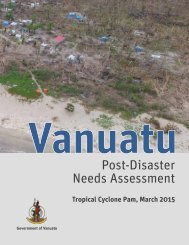Fiji
yqgk302EGjo
yqgk302EGjo
Create successful ePaper yourself
Turn your PDF publications into a flip-book with our unique Google optimized e-Paper software.
FIJI Post-Disaster Needs Assessment<br />
As was the case in the 2012 floods, anecdotal reports suggest that women and girls are offering sex in exchange for<br />
food. 119 In light of this, reproductive health services and outreach should, therefore, be strengthened to provide information<br />
and services on maternal health, sexual violence and adolescent sexual reproductive health. With regard to education, the<br />
projected decrease in economic output attributable to TC Winston could impact school enrolment. In response to trauma<br />
among children following the disaster, school programmes should continue to provide psychosocial support to children in<br />
order to reduce the long-term impact of psychological distress.<br />
Impact on the Productive Sector<br />
From a gender perspective, an analysis of the whole productive sector indicates that women lost a total of about F$120<br />
million in personal income loss (Table 69) as a result of the disaster, which is less than income losses incurred by men. This<br />
is because less women than men are employed. However, women are poorer, earn less income, are more dependent on<br />
subsistence economies, and, therefore, have fewer options to cope with the disaster impact than their male counterparts.<br />
Agriculture is an important form of employment for rural communities. Women hold a 33 percent share of the sector, 120<br />
and losses in personal income due to TC Winston for women employed in the agriculture sector total F$99 million. This<br />
economic impact could have profound consequences at the household level as women’s meager income is usually<br />
invested in food, nutrition and familial basic needs, and, hence, overall household wellbeing and economic advancement<br />
could be impacted.<br />
Table 69: Personal Income Losses Borne by Men and Women by Productive Sector and Transport Sector<br />
Sector Women’s share by sector (percentage) Personal income losses (F$ million)<br />
102 Tropical Cyclone Winston, February 20, 2016<br />
Total Men Women<br />
Agriculture 0.33 298.2 198.9 99.3<br />
Commerce 0.43 17.2 9.8 7.4<br />
Manufacturing 0.31 18.5 12.8 5.7<br />
Tourism 0.42 17.0 9.9 7.1<br />
Transport a 0.11 0.7 0.6 0.1<br />
Total 0.32 351.6 232.0 119.6<br />
Source: Estimations by Assessment Team.<br />
Extensive damage to and production loss of small livestock in general and damage to vegetables in the Western Division,<br />
resources normally under the control of women, have depleted women’s asset base and deprived them of key protein<br />
sources and extra income, leaving them vulnerable to economic hardship. Furthermore, agricultural production losses,<br />
especially in fisheries, are expected to last close to a decade. Rural women’s income will, therefore, remain depressed over<br />
a long period of time and, thus, rural women may require income and food assistance for a long time. Beyond agriculture,<br />
commerce and tourism, small and micro enterprises provide significant employment to <strong>Fiji</strong>ans. The proportion of women in<br />
the informal sector is large, especially in SMEs and trading. While the low entry capital requirement and the flexible hours<br />
allow engagement in the sector and meeting reproductive obligations, the informality of the sector also leaves women with<br />
limited social protection to cope with the impacts, unlike paid workers. Most micro-enterprises in the affected areas are<br />
agro-based, comprised mainly of food processing, handicrafts and weaving. Damage to homes, raw materials and raw<br />
materials processing equipment, transport disruptions and depressed markets 121 have affected the ability of both men and<br />
women to derive livelihoods. Worse still, savings needed to restore their businesses will be diverted towards meeting basic<br />
household and home reconstruction needs. Soft loans and medium- and long-term skills development and direct access<br />
to external markets are also needed for women entrepreneurs to restart their businesses, reduce their reliance on local<br />
tourist markets and enhance their resilience against future disasters.<br />
In general, the combination of lost income, dependence on subsistence farming, constraints in mobility for other job<br />
options, limited access to finance and increased reproductive responsibilities will increase women’s economic hardship<br />
and dependence. Taking into account women’s large contribution to the informal sector and the constraints they face in<br />
recovery, efforts should be made to ensure that recovery programmes do not contribute to greater gender inequalities and<br />
increased poverty for women. Targeted investment in women should be an integral part of all recovery strategies in the<br />
productive sectors. Policies that seek to reduce the dependence of women on the natural resource base and proactively<br />
address the underlying drivers that make women more impoverished than men are essential. Affirmative action should<br />
be implemented to ensure the participation and benefit to women in reconstruction programmes. Skills development in<br />
entrepreneurship and masonry combined with market development will be important in reducing women’s dependence on<br />
agriculture and building their resilience against future disasters.<br />
119<br />
Based on the Gender Based Violence Sub-Cluster Advocacy Note: Gender-Based Violence in the Aftermath of the <strong>Fiji</strong> Tropical Cyclone<br />
Winston.<br />
120<br />
ADB 2015: <strong>Fiji</strong> Country Gender Assessment.<br />
121<br />
Based on interviews with women handcraft sellers in Lautoka.



